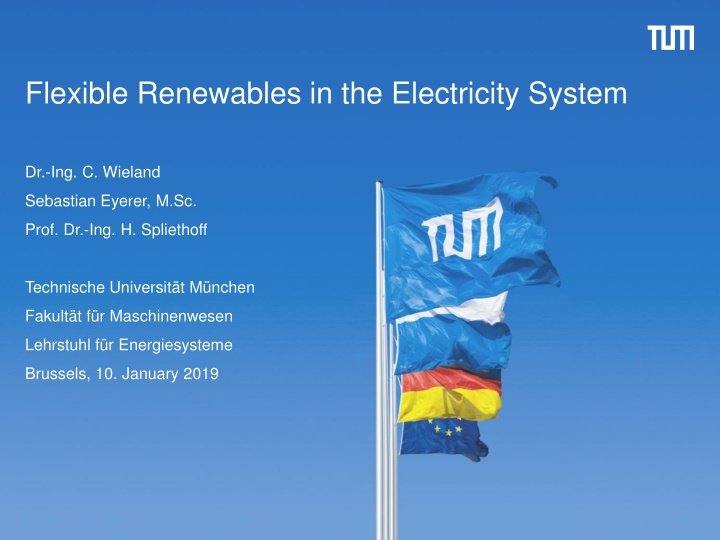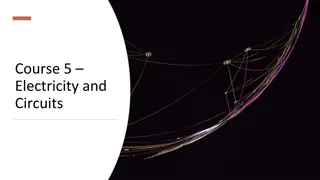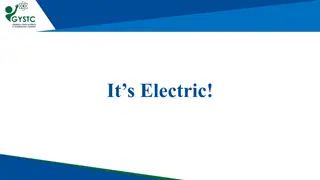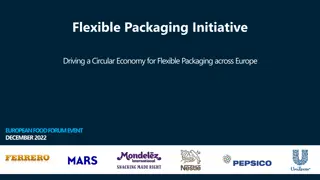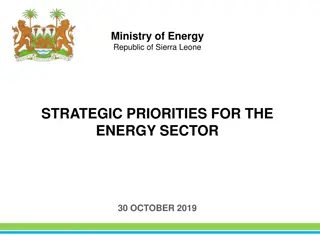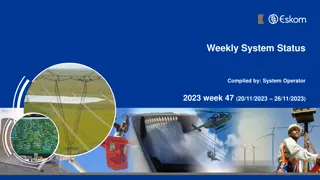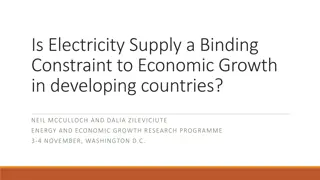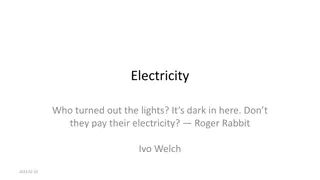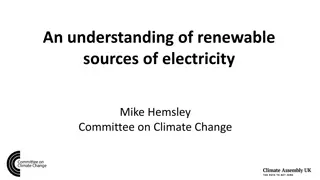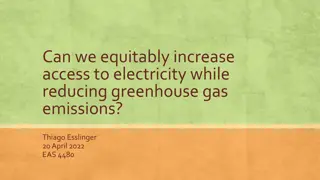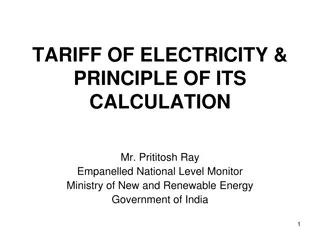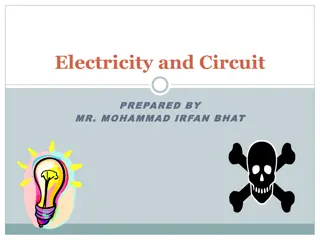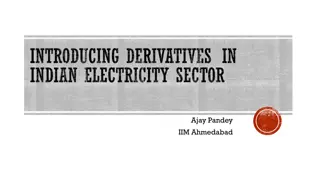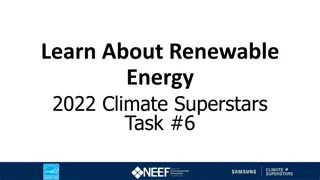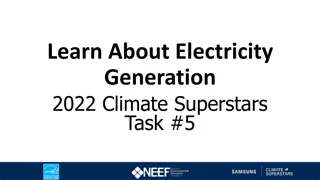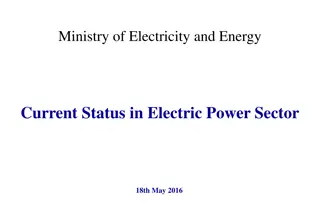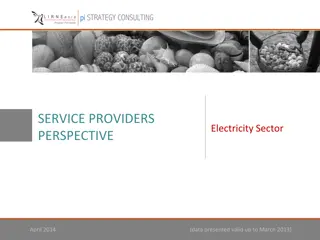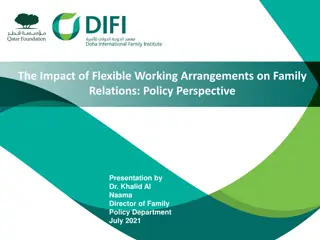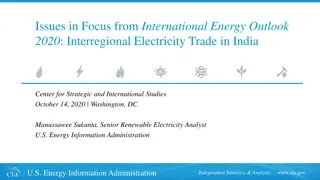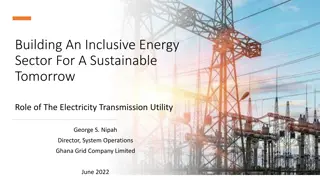Flexible Renewables in the Electricity System
In this study by Technische Universität München, the focus is on the role of user behavior, control power, and key issues learned from Germany in incorporating flexible renewables in the electricity system. The analysis includes insights into electricity demand variations, types of control power required, and suitable technologies for sustainable energy transition.
Download Presentation

Please find below an Image/Link to download the presentation.
The content on the website is provided AS IS for your information and personal use only. It may not be sold, licensed, or shared on other websites without obtaining consent from the author.If you encounter any issues during the download, it is possible that the publisher has removed the file from their server.
You are allowed to download the files provided on this website for personal or commercial use, subject to the condition that they are used lawfully. All files are the property of their respective owners.
The content on the website is provided AS IS for your information and personal use only. It may not be sold, licensed, or shared on other websites without obtaining consent from the author.
E N D
Presentation Transcript
Flexible Renewables in the Electricity System Dr.-Ing. C. Wieland Sebastian Eyerer, M.Sc. Prof. Dr.-Ing. H. Spliethoff Technische Universit t M nchen Fakult t f r Maschinenwesen Lehrstuhl f r Energiesysteme Brussels, 10. January 2019 1
Outline 1. User Behaviour 2. Control Power as Such 3. Key Issues Learned From Germany 4. Examples of Suitable Technologies 5. Sustainability in Energy Transition Technische Universit t M nchen | FlexiRES, Brussels 10.01.2019 | Christoph Wieland 2
1. Electricity demand of individual households Load/demand is fluctuating depending on user behavior Standard load profiles are derived, somehow approximate or forecast the demand Stochastic user behavior is superpositioned 3 Technische Universit t M nchen | FlexiRES, Brussels 10.01.2019 | Christoph Wieland
1. Electricity demand in Germany Source: https://www.energy-charts.de/power.htm Wind varies significantly, solar has low contributions, coal and gas are enabling integration Daily fluctuations 5 Technische Universit t M nchen | FlexiRES, Brussels 10.01.2019 | Christoph Wieland
1. Electricity demand in Germany Source: https://www.energy-charts.de/power.htm Wind and solar vary significantly, coal and gas are enabling integration Up to two significant fluctuations per day, due to high solar share 6 Technische Universit t M nchen | FlexiRES, Brussels 10.01.2019 | Christoph Wieland
Electricity production needs to fulfil the demand at any time.
2. Types of control power Power Primary control power Secondary control power Minute reserve power Time Source: [1] Unscheduled power plant outages Load fluctuations Forecasting errors of load Forecasting errors of renewable energy production Technische Universit t M nchen | FlexiRES, Brussels 10.01.2019 | Christoph Wieland 8
Control power can be purchased on markets, provided by power plants
3. Local Imbalances I National imbalances between supply and demand (Wind: North, Demand: South) Electricity grid limitations cause electricity flow through grids in neighboring countries Frequent frauds cause protectionism by installation of quadrature boosters/phase shifters Technische Universit t M nchen | FlexiRES, Brussels 10.01.2019 | Christoph Wieland 10
3. Local Imbalances II National imbalances between supply and demand (Wind: North, Demand: South) Wind plants are curtailed and fossil reserve power is activated. Double costs for wasted RES and redispatched (fossil) reserve power Technische Universit t M nchen | FlexiRES, Brussels 10.01.2019 | Christoph Wieland 11
3. No Wind (and no PV) Low wind conditions lead to shortage in power supply Reduced (fossil) generation capacity cannot fully compensate Neighboring countries need to provide electricity with their generation capacity Technische Universit t M nchen | FlexiRES, Brussels 10.01.2019 | Christoph Wieland 12
We need (1) more local renewable and dispatchable capacities and (2) to generate local microgrids
4. Example: Biomass Source: adapted from [2] and [3] Increasing ICEngine and/or Biogas tank for enabling flexibility potential Technische Universit t M nchen | FlexiRES, Brussels 10.01.2019 | Christoph Wieland 14
4. Example: Geothermal CHP Source: [4] Technische Universit t M nchen | FlexiRES, Brussels 10.01.2019 | Christoph Wieland 15
4. Example: Geothermal CHP Industrial waste heat Heat pumps Power-to-heat Heat storage Source: [4] Increasing the flexibility of renewable CHP technology for enabling flexibility potential Technische Universit t M nchen | FlexiRES, Brussels 10.01.2019 | Christoph Wieland 16
4. Example: Aggregators (e.g. Next Kraftwerke) Biogas CHP PV Systems Wind power plants Natural gas CHP Dispatchable plants Hydro plants Large scale renewable plants Energy intesive industry Source: [5] Technische Universit t M nchen | FlexiRES, Brussels 10.01.2019 | Christoph Wieland 17
4. Example: Aggregators (e.g. Next Kraftwerke) Pooling generation capacity Placing control power on markets Restrictions for market access in Germany: 5 MW (until 2018) 1 MW (from 2018) What s up next? Source: [5] Technische Universit t M nchen | FlexiRES, Brussels 10.01.2019 | Christoph Wieland 18
5. Costs vs. Sustainability Triple-Bottom-Line Each section is treated equally and of same importance. Priority Modell Sections will be prioritized with increased importance Social Environmental Social Environ- mental Financial Financial 19 Technische Universit t M nchen | FlexiRES, Brussels 10.01.2019 | Christoph Wieland
We need to reconsider the importance of environmental issues in a sustainable development.
References [1] Eyerer et al.: Praxisforum Geothermie.Bayern 2017 [2] Schuster et al.: Energetic and economic investigation of Organic Rankine Cycle applications, Applied Thermal Engineering, 29 (2009), pp. 1809 1817 [3] J. Karl, Dezentrale Energiesysteme, Neue Technologien im liberalisierten Energiemarkt, Oldenbourg Verlag, M nchen, 2004 [4] Dawo: Strom aus Geothermie Stromw sche oder reales Potential?, Seminarvortrag, Lehrstuhl f r Energiesysteme, 19.10.2018 [5] Aengenvoort: Next Kraftwerke Intelligente Kombination Erneuerbarer/Konventioneller Technik / Insell sungen, Vortragsreihe des VDI-AK Energietechnik und des Lehrstuhls f r Energiesysteme, M nchen, 14.03.2016 Technische Universit t M nchen | FlexiRES, Brussels 10.01.2019 | Christoph Wieland 21
Flexible Renewables in the Electricity System Dr.-Ing. C. Wieland Sebastian Eyerer, M.Sc. Prof. Dr.-Ing. H. Spliethoff Technische Universit t M nchen Fakult t f r Maschinenwesen Lehrstuhl f r Energiesysteme Brussels, 10. January 2019 22
Back-Up RE Costs Technische Universit t M nchen | FlexiRES, Brussels 10.01.2019 | Christoph Wieland 23
